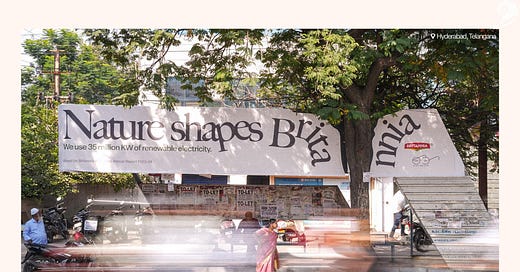I Fact-Checked This Cannes-Winning Sustainability Campaign. It's Bullshit.
Six billboards celebrated Britannia's sustainability report. So I read it: water use nearly doubled, CO2 emissions are up, and plastic waste has surged.
One day, ad awards entries will be taught in universities. Something like: “Vanity Metrics: When Climate Action Became Performance Art.” We’ll pretend we had nothing to do with it. But our names will still be there – right under the ridiculous case studies we wrote ourselves.
This year’s Cannes Lions entries are a wild ride, and 'Nature Shapes Britannia' is a prime example. The agency Talented entered it 18 times across seven categories — from Outdoor to Sustainable Development Goals. The effort is paying off: it’s already won a Silver Lion in Outdoor and made the shortlist in Media and Industry Craft. Other juries seemed to know better.
Here’s the pitch:
“This groundbreaking campaign used nature as its canvas, partnering with billboards obstructed by trees, allowing nature to ‘design’ each one… This adaptive mindset has propelled their 2024 sustainability achievements, including being plastic neutral for three years and recycling 50% of withdrawn water.”
They claim the idea could save 20,000 trees “killed” in India for obstructing billboards. Britannia saved six, one for every three of their Cannes submissions. But someone else can save the other 19,994 – they’ve provided an ‘open-source design manual’ because, you know, only scalable solutions will rescue us from this deepening environmental crisis.
For context: Britannia is a $2B processed food giant selling biscuits, cakes, and tubs of cheese with a laughing cow.
“Each tree bent or curved the brand name differently, highlighting a different milestone in Britannia’s sustainability report.”
Love a good sustainability report. So I did what most agencies don’t: I read it. It’s 302 pages long, which makes finding the key numbers an insane challenge. I studied it anyway – out of morbid curiosity.
Water Stewardship: The campaign talks about “recycling 50% of withdrawn water.” Recycling water is good, right? Let’s go to page 121 of the Annual Report, and it turns out Britannia’s absolute water withdrawal almost doubled in a year – from 564,843 kL (FY23) to 1,012,259 kL (FY24). India is one of the most water-stressed countries. It has recently lost six million mature trees on agricultural lands. Saving six trees while consuming an extra half-million kilolitres of water in a water-stressed region – and making a Sustainable Development Goals case study out of it – is so cynical, it’s breathtaking.
Energy Consumption: One of the billboards celebrates the use of renewable electricity. Let’s go to page 120. Britannia’s energy consumption from non-renewables jumped from 1,324,122 GJ (FY23) to 1,775,846 GJ (FY24). The share of renewables went down by 6% (page 36). Direct CO₂ (Scope 1) soared from 75,814 t to 93,583 t; purchased power emissions (Scope 2) from 50,257 t to 66,405 t (page 122). Supply-chain emissions (Scope 3) skyrocketed from 2.5 million t to 4.25 million t (page 125).
In 2024, Britannia expanded, not contracted, its climate impact. So much for “adapting to nature’s needs.”
Plastic Neutrality: My personal favourite. Britannia claims “Plastic neutrality” through Extended Producer Responsibility (EPR) — an offsetting scheme — meaning that for the amount of plastic it introduces into the market, an equivalent amount of plastic waste has been collected and ‘responsibly processed’ (page 36). Nobody really knows what’s behind the mysterious phrase ‘responsibly processed’. Could be like-for-like recycling, could be incineration.
But here’s the best part: Britannia’s own plastic waste generation increased from 3,398 MT in FY23 to 4,858 MT in FY24 (page 122).
So, in 2024, while Britannia saved six trees from being trimmed to celebrate ‘different milestones’ in its sustainability report, that same report shows a nearly doubled absolute water withdrawal, significantly increased energy consumption from non-renewables, a decreased share of renewable electricity, expanding CO2 emissions, and increased plastic waste generation.
In 2024, Britannia allocated just 0.5% of its total capital expenditure to environmental/social impact projects, down from 0.8% the year before (page 105).
Results (quoting from the submission):
Britannia + Sustainability saw a spike of 65% in mentions and 1500% in reach
Positive brand sentiment rose by 68%
8.3 million impressions within 2 weeks of launch
Featured in 200+ publications across 11 languages
149x return on campaign investment
YouTube engagement up 2386%
Instagram engagement up 1169%
Twitter audience engagement up 650%
LinkedIn engagement surged 143%
Well done to everyone involved. Heroes.






now imagine if they used all the money spent on this advertising campaign to instead just remove all these billboards from continuing to junk up the local environment...
This is astonishing. How on earth can a report like that be allowed to win a sustainability award? This needs major traction to hold Cannes to account